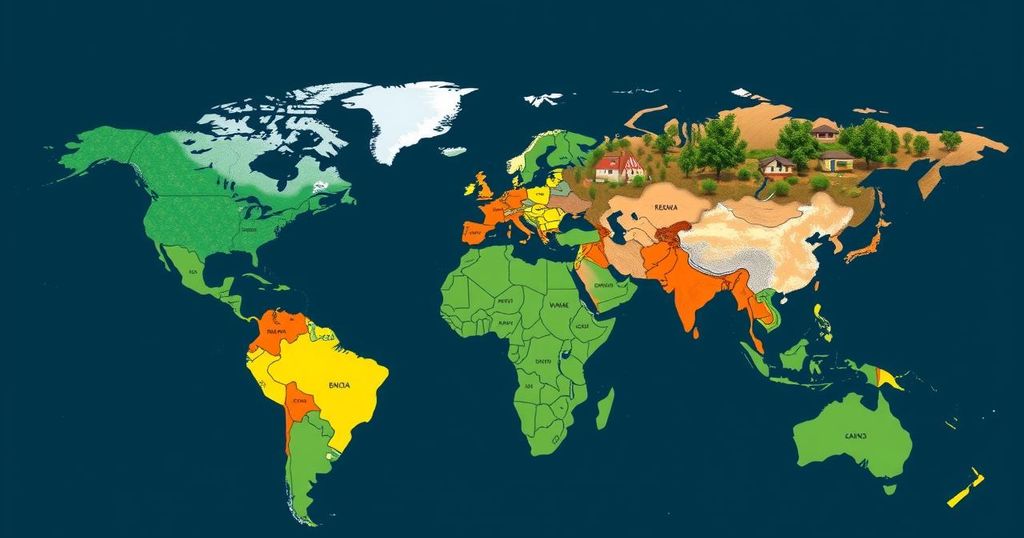Richer Nations Begin Compensating Poorer Countries for Climate Change Damages

Wealthy countries are beginning to compensate poorer nations for climate change damages, as highlighted by the case of Christopher Bingala in Malawi, who received approximately $750 after losing his home to Cyclone Freddy. A fund has been established for such compensations, with $720 million pledged from nations like the U.S. and the European Union. However, experts warn this amount may be inadequate given the worsening climate crisis. Negotiations are ongoing to define further obligations and allocations at COP29 in Azerbaijan.
Richer nations are beginning to compensate poorer countries for the damages inflicted by climate change, highlighted by the case of Christopher Bingala in Malawi, whose home was destroyed by Cyclone Freddy. Following this devastating event in 2023, Bingala received approximately $750 in “loss and damage” compensation, which is intended to provide financial support for communities affected by climate-related disasters. This funding initiative stems from an agreement made by wealthy countries to establish a dedicated fund for such compensations, acknowledging that low-income nations are disproportionately affected yet have contributed minimally to the climate crisis.
Thus far, about $720 million has been pledged from countries, including the European Union and the United States. However, climate experts caution that this sum will be insufficient given the increasing severity of extreme weather events. During COP29 in Baku, Azerbaijan, negotiations are ongoing to determine the obligations toward developing nations as part of a broader framework encompassing loans and investments.
Cyclone Freddy significantly impacted Malawi, displacing 650,000 individuals. Bingala articulated the dire circumstances he and his family faced, indicating, “We got to a point where we would eat meat from animals that had died from the cyclone because we lacked food.” Fortunately, with the aid he received, Bingala relocated to a safer area, allowing his family to rebuild their lives and move towards a more stable future.
Scotland was notably the first country to allocate funds specifically for loss and damage compensation. The implemented cash payments, administered through organizations like GiveDirectly, benefited around 2,700 families, enabling them to restore their livelihoods. As described by Yolande Wright from GiveDirectly, households in low-income regions possess drastically fewer protective resources against extreme climate events.
This initiative is seen as a pilot program for a broader system aimed at supporting nations severely impacted by climate change. Historically, the majority of greenhouse gas emissions have originated from wealthier regions, prompting calls for recognition of their responsibilities towards those bearing the brunt of environmental degradation.
The necessity for funding related to climate-induced damages is projected to escalate dramatically, with estimates indicating a potential need of $250 billion annually by 2030. Prime Minister Philip Davis of the Bahamas remarked on the urgent need for action, asserting, “If they do nothing, they will be the worst for it.” The challenges faced by developing nations are significant, as they navigate both the impacts of climate disasters and the associated financial burdens, which often lead to increased national debts.
As discussions continue at the COP29 summit, it remains crucial to establish practical guidelines to ensure that funding effectively reaches those most in need, from disaster recovery to proactive measures against the repercussions of climate change. In conclusion, the commitment from wealthier nations to provide financial redress for climate damages represents a pivotal step towards justice and global accountability, yet substantial work remains to actualize these pledges fully and equitably.
The article addresses the emerging practice of wealthier countries compensating poorer nations for the damages caused by climate change. This concept has gained traction in light of the increasing frequency and severity of climate-related disasters, particularly affecting low-income communities, which contribute the least to the crisis. Specifically, this narrative is illustrated through the experience of Christopher Bingala from Malawi, whose family was affected by Cyclone Freddy, and the subsequent implementation of the “loss and damage” compensation fund agreed upon by various nations at recent climate conferences. The urgency for such financial support is emphasized by the growing number of displaced individuals and the financial strain on countries already burdened by debt due to climate events.
In summary, the trend of richer nations compensating poorer ones for climate-related damages marks a significant step toward addressing the imbalances caused by climate change. The experiences of individuals like Christopher Bingala highlight the desperate need for targeted support in the wake of extreme weather events. As negotiations continue at global summits, the focus must remain on creating effective frameworks for funding and implementing solutions that help vulnerable populations adapt and recover from the devastating impacts of climate change. The sustainability of these efforts will ultimately depend on the willingness of wealthier nations to acknowledge their historical responsibilities and act in solidarity.
Original Source: www.kanw.com






